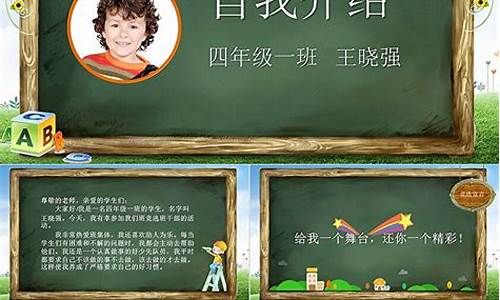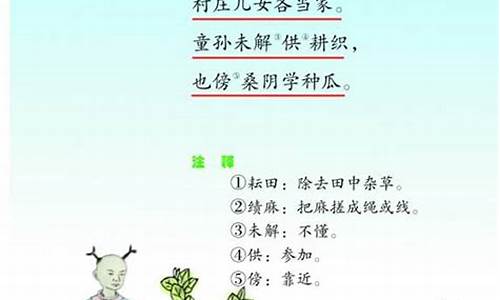经典英语美文欣赏50篇_经典英语美文欣赏50篇催眠
如果您对经典英语美文欣赏50篇感兴趣,那么我可以提供一些关于它的背景和特点的信息,以及一些相关的资源和建议。
1.励志短篇英语美文摘抄
2.求适合高一学生背诵的英语美文,每篇50个字就行,越多越好,谢谢!!!
3.求几篇英语美文!!!急!!!要符合初中只是!
4.经典美文佳作双语

励志短篇英语美文摘抄
学生通过大量的经典英语美文阅读能够开阔自己的视野,对于英语水平的提高也有很大的帮助。几天奶奶我精心收集了短篇励志英语美文,供大家欣赏学习!
短篇励志英语美文篇1
找寻自己Find Yourself
Who are we? That is the first question. It’s a question that’s almost impossible to answer.
我们到底是谁?这是我们要解答的第一个问题,是一个几乎回答不了的问题
But we all agree that one’s busy or daily self is not quite one’s real self. We’re quite sure that we’ve lost something in the course of just making our living.。
但是我们都同意这一点,那个每天在日常生活中奔忙的自己,并不是我们真实的自己。我们都很清楚,我们在为生计奔波的过程中失去了某些东西。
A crowd is watching a person running about looking for something in a field, and a wise man asks, “What has that person lost?” Someone may guess a watch, another a diamond ring. When everyone has guessed, the wise man who like everyone else there has no idea, says, “I’ll tell you one thing for sure. He’s lost some breath.”
当一群人看着一个人在田野中奔跑着寻找某个东西时,智者向他们出了一个谜题:“那个人到底丢失了什么?”有个人认为是一块手表,另一个人认为是一枚钻石戒指。其他人也有不同的答案,智者也不知道那个人丢失了什么,但他却说:“我可以明确地告诉你们一件事,他丢失了一些生命力。”
And no one can deny that he’s right. The point is that we often forget our true selves in pursuit of things that are external1 to us, like a bird forgetting its own danger in pursuit of a mantis, which in turn forgets its own danger in pursuit of some other prey.
没有人认为智者所言是错的。其实我们经常在为生计奔波时忘记了我们自己,就像一只鸟在捕捉螳螂时忘记了自己的安危,相应地,螳螂在捕捉它的猎物时也忘记了自己的安危。
短篇励志英语美文篇2
停止Just Quit
Quit making excuses! Making excuses or blaming others for any situation in your life is nothing more than playing the victim.
停止编造借口!无论生活中发生何种情况,编造借口或责怪他人无非是一种假扮受害者的行为。
Take responsibility! Make your life decisions, and if you don’t, then it’s your fault. You are a spiritual being in a physical body, and your spirit should run your life. Take it back! Make today the day you quit playing the victim by making excuses and blaming others for what happens to you.
承担起责任!你应自己做决定,如果没有,那么这是你的失误。你的思想存在于你的身体里,而你的思想左右你的生活。取回你的思想!从今天开始,当面对发生在你身上的事时,停止编造借口或责怪他人。
Quit procrastinating! Cancer is not the most deadly killer; procrastination is. It kills dreams. It kills your future. Never use the phrase “I’ll try”. There is no such thing as trying. Pay attention when others use this phrase: ninety-nine percent of the time they do nothing. The words are just an easy way to fort oneself.
不要拖延!癌症并非最可怕的杀手,拖延才是。它扼杀梦想;它断送未来。绝不说“我试试!”这样的话,并没有尝试一说。当其他人这么说时你应注意到,99%的可能是他们并未尝试。这些词不过是种简单的自我安慰。
Quit thinking self-defeating thoughts! Quit thinking that you can’t do what you want to do. It’s not what you are that’s holding you back; it’s what you think you are. You were given all the equipment you need to acplish anything you desire. Use that power today.
拒绝那些会让你受到打击的想法!不要认为你无法完成你想做的事。让你退却的不是你的现状如何,而是你怎样评价自己。你具备那些能够使你达成梦想的条件,从今天起,让它们发挥作用。
As for bad habits: just quit! Take the challenge. Pick one, and quit it this week. Next week pick another, and so on. Improve your life by being a “quitter” now.
戒掉不良习惯!接受这项挑战。选一个坏习惯,从这个星期开始,戒掉它!下周开始另一个,以此类推。做一个“终结者”,让你的生活越来越好。
短篇励志英语美文篇3
决定过你的理想生活
What is your most ideal day? Do you know exactly how you want to live your life for the next five days, five weeks, five months or five years? When was the last best day of your life? When is the next?
你最理想的一天生活是怎样的?你知道你想怎样度过接下来的五天、五周、五个月甚至五年吗?你度过的最后一个美好的一天是什么时候?下一个美好的一天又将何时到来?
The best day of our lives is today. The past is no longer here. We cannot enjoy it any longer. To dwell on the past is to waste the opportunity to enjoy the present. The future is a promise, a time that will not e because what we have is only today. When tomorrow es, it will not be tomorrow any more; it bees your today. You cannot enjoy tomorrow unless you know how to enjoy your today. If you are to live thirty more years, you are going to experience 10,950 todays. But every day that passes without your notice is a day cut off from your life. Your life is a day shorter every new day.
在我们的生活中,今天是最美好的。过去已经消逝,我们无法再享受它。沉溺于过去只会糟蹋了享受现在的机会。未来是一句承诺,一段尚未来到的时光,因为我们拥有的只是现在。当明天到来,它也即将不再是明天,而变成你的今天。只有当你懂得如何珍视今天,你才能学会如何享受明天。如果你还有三十年的光阴,你将经历10950个今天。但每一个逝去却得不到你注意的日子都是生命的一天损失。每一个崭新的一天都意味着生命随之减少一天。
Each day is a decision to live. Today is a gift; this is why it is called the "present". How you use this day is up to you. At each new day, you decide whether to unwrap that gift, or let it stay in the corner and spoil. Each day is a decision to live your ideal life.
每天都是一次生活的选择。今天是一份礼物,这也正是为什么它被称作"礼物"英文中,"现在"一词也有"礼物"的意思。你将如何利用这一天是你的选择。每天,你都要作出选择:是拆开这份礼物,还是把它留在墙角,毁掉它。每天都是一次通往理想生活的抉择。
1.英语美文欣赏励志篇
2.青春励志英语短文精选
3.励志英语短文150字
4.经典英语美文名人励志故事
5.青春励志英语短文100字
求适合高一学生背诵的英语美文,每篇50个字就行,越多越好,谢谢!!!
英语作为学习生涯中必不可少的课程,想学好真的不容易。我在此献上英语美文,希望大家喜欢。英语经典美文欣赏
一切刚开始 We're Just Beginning
"We are reading the first verse of the first chapter of a book whose pages are infinite?
?我们正在读一本书的第一章第一行,这本书的页数是无限的
I do not know who wrote those words, but I have always liked them as a reminder that the future can be anything we want to make it. We can take the mysterious, hazy future and carve out of it anything that we can imagine, just as a sculptor carves a statue from a shapeless stone.
我不知道是谁写的,可我很喜欢这句话,它提醒我们未来是由自己创造的。我们可以把神秘、不可知的未来塑造成我们想象中的任何模样,犹如雕刻家将未成形的石头刻成雕像。
We are all in the position of the farmer. If we plant a good seed, we reap a good harvest. If our seed is poor and full of weeds, we reap a useless crop. If we plant nothing at all, we harvest nothing at all.
我们每个人都像是农夫。洒下良种将有丰收,播下劣种或生满野草便将毁去收成。没有耕耘则会一无所获。
I want the future to be better than the past. I don't want it contaminated by the mistakes and errors with which history is filled. We should all be concerned about the future because that is where we will spend the remainder of our lives.
我希望未来比过去更加美好,希望未来不会沾染历史的错误与过失。我们都应举目向前,因我们的余生要用未来书写。
The past is gone and static. Nothing we can do will change it. The future is before us and dynamic. Everything we do will affect it. Each day brings with it new frontiers, in our homes and in our business, if we only recognize them. We are just at the beginning of the progress in every field of human endeavor.
往昔已逝,静如止水;我们无法再作改变。而前方的未来正生机勃勃;我们所做的每一件事都将会影响着它。只要我们认识到这些,无论是在家中还是在工作上,每天我们的面前都会展现出新的天地。在人类致力开拓的每一片领域上,我们正站在进步的起跑点。
英语美文欣赏
别让这个时代越来越冷漠 Don?t Make the era More and More Indifferent
The paradox of our time in history is that we have taller buildings, but shorter tempers; wider freeways, but narrower viewpoints; we spend more, but have less; we buy more but enjoy less.
我们这个时代在历史上的说法就是我们拥有更高的建筑,但是有更暴的脾气;我们拥有更宽阔的高速公路,却有更狭隘的观点;我们花费得更多,拥有得却更少;我们购买得更多却享受得更少。
We have bigger houses and smaller families; more conveniences, but less time; we have more degrees, but less sense; more knowledge, but less judgment; more experts, but more problems; more medicine, but less wellness.
我们的房子越来越大,家庭却越来越小;便利越来越多,时间却越来越少;学位越来越多,感觉却越来越少;知识越来越多,观点却越来越少;专家越来越多,问题也越来越多;药物越来越多,健康却越来越少。
We drink too much, spend too recklessly, laugh too little, drive too fast, get too angry too quickly, stay up too late, get up too tired, read too little, watch TV too much, and pray too seldom.
我们喝得太多,花钱大手大脚,笑得太少,开车太快,易怒,熬夜,赖床,书读得越来越少,电视看得越来越多,却很少向上帝祈祷。
We talk too much, love too seldom, and hate too often. We?ve learned how to make a living, but not a life; we?ve added years to life, not life to years.
我们常常夸夸其谈,却很少付出爱心,且常常心中充满了仇恨。我们学会了如何谋生,而不知如何生活。我们延长了生命的期限,而不是生活的期限。
We?ve been all the way to the moon and back, but have trouble crossing the street to meet the new neighbor. We?ve conquered outer space, but not inner space; we?ve done larger things, but not better things.
我们登上了月球,并成功返回,却不能穿过街道去拜访新邻居。我们已经征服了太空,却征服不了自己的内心;我们的事业越做越大,但质量却没有提高。
We?ve cleaned up the air, but polluted the soul; we?ve split the atom, but not our prejudice. We write more, but learn less; we plan more, but accomplish less.
我们清洁了空气,却污染了灵魂;我们分离了原子,却无法驱除我们的偏见;我们写得更多,学到的却更少;我们的计划更多,完成的却更少。
We?ve learned to rush, but not to wait; we have higher incomes, but, lower morals.
我们学会了奔跑,却忘记了如何等待;我们的收入越来越高,道德水平却越来越低。
We build more computers to hold more information to produce more copies than ever, but have less communication; we?ve become long on quantity, but short on quality.
我们制造了更多的计算机来存储更多的信息,制造了最多的副本,却减少了交流;我们开始渴望数量,但忽视了质量。
These are the days of two incomes, but more divorce; of fancier houses, but more broken homes.
这个时代有双收入,但也有了更高的离婚率;有更华丽的房屋,却有更多破碎的家庭。
These are the days of quick trips, disposable diapers, throw away morality, one night stands, overweight bodies, and pills that do everything from cheer, to quiet, to kill. Where are we heading...?
这个时代有了快速旅游,免洗尿布,却抛弃了道德、一夜情、超重的身体,以及可以从快乐中走向静止和自杀的药物。我们将走向何方
If we die tomorrow, the company that we are working for could easily replace us in a matter of days. But the family we left behind will feel the loss for the rest of their lives.
如果我们明天就死掉,我们为之工作的公司可能会在一天内很轻易地找人代替我们的位置。但是当我们离开家人后,他们的余生将会在失落中度过。
And come to think of it, we pour ourselves more into work than to our family an unwise investment indeed.
考虑一下吧,我们将自己的时间更多地投入到工作中,而放弃与家人在一起的时光,实在并非明智之举。
So what is the morale of the story?
那么这则故事的主旨是什么呢?
Don?t work too hard... and you know what?s the full word of family?
不要工作得太辛苦,你知道家的全称吗?
FAMILY = (F)ATHER (A)ND (M)OTHER, (I) (L)OVE (Y)OU.
家=爸爸妈妈,我爱你们。
英语经典美文欣赏
50%的希望 Fifty-percent Expectation
I believe in the "50-percent theory". Half the time things are better than normal; the other half, they are worse. I believe life is a pendulum swing. It takes time and experience to understand what normal is, and that gives me the perspective to deal with the surprises of the future.
我信奉?对半理论?。生活时而无比顺畅,时而倒霉透顶,好坏参半。我觉得生活就像来回晃动的钟摆。读懂生活的常态需要时间和阅历,也正是这样才练就了我面对未来荣辱不惊的生活态度。
Let's benchmark the parameters: Yes, I will die. I've dealt with the deaths of both parents, a best friend, a beloved boss and cherished pets. Some of these deaths have been violent, before my eyes, or slow and agonizing. Bad stuff, and it belongs at the bottom of the scale.
让我们掂量这些点点滴滴:是的,我注定会死去。我已经经历了双亲的仙逝,一位友人的亡故,一位敬爱的老板的离逝,还有心爱宠物的死亡。当中一些变故突如其来,直击眼前;有些却长期折磨,痛苦不堪。糟糕的事儿,它们驻留谷底。
Then there are those high points: romance and marriage to the right person; having a child and doing those Dad things like coaching my son's baseball team, paddling around the creek in the boat while he's swimming with the dogs, discovering his compassion so deep it manifests even in his kindness to snails, his imagination so vivid he builds a spaceship from a scattered pile of Legos.
当然生活也不乏熠熠光彩:坠入爱河缔结良缘;养育幼子身为人父,训练儿子的棒球队,当他和狗在水中嬉戏时,摇桨划船前瞻后顾,感受他如此强烈的同情心?即使对蜗牛也善待有加,发现他如此活跃的想像力?即使零散的积木也能堆出太空飞船。
But there is a vast meadow of life in the middle, where the bad and the good flip-flop acrobatically. This is what convinces me to believe in the 50-percent theory.
但在它们发生期间有一片宽广的草坪,在那儿上演的各种好事坏事像耍杂技一样地翻新。这就是让我信服对半理论的原因。
One spring I planted corn too early in a bottomland so flood-prone that neighbors laughed. I felt chagrined at the wasted effort. Summer turned brutal-- the worst heat wave and drought in my lifetime. The air-conditioner died,the well went dry, the marriage ended, the job lost, the money gone. I was living lyrics from a country tune -- music I loathed. Only a surging Kansas CityRoyals team, bound for their first World Series, buoyed my spirits.
有一年春天,我在一片容易被淹的低洼地过早种下了玉米,邻居们都为此嘲笑我。一番心血付之东流让我懊恼不已。接着我生命中最难熬的酷暑来临了--热浪袭人,酿至旱灾。空调失灵,水井枯竭,婚姻破裂,惨遭失业,积蓄挥空。我正经历某个乡村调频描绘的情节,我讨厌这种音乐。只有一支人气攀升的堪萨斯皇家棒球队的小组因他们的第一次出征世界大赛团结起来使我精神振奋。
Looking back on that horrible summer, I soon understood that all succeeding good things merely offset the bad. Worse than normal wouldn't last long. I am owed and savor the halcyon times. They reinvigorate me for the next nasty surprise and offer assurance that I can thrive. The 50 percent theory even helps me see hope beyond my Royals' recent slump, a field of struggling rookies sown so that some year soon we can reap an October harvest.
回想那个可怕的夏天,我不久就明白了所有的好事坏事不过是正负抵消。不顺心的境遇不会延宕过久。太平时光是我应得的,我要尽情享受。它们给我新的活力以应对突如其来的险境,并确保我再度辉煌。对半理论甚至帮我在我喜爱的皇家棒球队最近的低潮中看到希望?这是一块艰难行进的新手们耕耘的土地,播种了,假以时日我们就可以收获十月的金秋。
Oh, yeah, the corn crop? For that one blistering summer, the ground moisture was just right, planting early allowed pollination before heat,withered the tops, and the lack of rain spared the standing corn from floods. That winter my crib overflowed with corn -- fat, healthy three-to-a-stalk ears filled with kernels from heel to tip -- while my neighbors' fields yielded only brown, empty husks.
哦,对了,玉米收成?就那年炎热的夏天,庄稼地的湿度恰到好处,过早的种植使授粉避开酷热在顶梢干枯前完成,雨水稀少使地里长着的玉米免遭水灾。那年冬天,我的粮仓里堆满了玉米--饱满结实的玉米每株秆上结三个,每个玉米从底到顶端长满了玉米粒--而我的邻居们地里长出来的只是暗沉干瘪的壳。
Although plantings past may have fallen below the 50-percent expectation, and they probably will again in the future, I am still sustained by the crop that flourishes during the drought.
尽管过去播种的收获没有达到50%的期望,而且将来也可能是这样,我仍然要为经历旱季依然丰收的玉米而坚守阵地。
求几篇英语美文!!!急!!!要符合初中只是!
第一篇:Youth 青春Youth is not a time of life; it is a state of mind; it is not a matter of rosy cheeks, red lips and supple knees; it is a matter of the will, a quality of the imagination, a vigor of the emotions; it is the freshness of the deep springs of life.
Youth means a temperamental predominance of courage over timidity, of the appetite for adventure over the love of ease. This often exists in a man of 60 more than a boy of 20. Nobody grows old merely by a number of years. We grow old by deserting our ideals.
Years may wrinkle the skin, but to give up enthusiasm wrinkles the soul. Worry, fear, self-distrust bows the heart and turns the spirit back to dust.
Whether 60 or 16, there is in every human being’s heart the lure of wonders, the unfailing appetite for what’s next and the joy of the game of living. In the center of your heart and my heart, there is a wireless station; so long as it receives messages of beauty, hope, courage and power from man and from the infinite, so long as you are young.
When your aerials are down, and your spirit is covered with snows of cynicism and the ice of pessimism, then you’ve grown old, even at 20; but as long as your aerials are up, to catch waves of optimism, there’s hope you may die young at 80.
译文:
青春不是年华,而是心境;青春不是桃面、丹唇、柔膝,而是深沉的意志,恢宏的想象,炙热的恋情;青春是生命的深泉在涌流。
青春气贯长虹,勇锐盖过怯弱,进取压倒苟安。如此锐气,二十后生而有之,六旬男子则更多见。年岁有加,并非垂老,理想丢弃,方堕暮年。
岁月悠悠,衰微只及肌肤;热忱抛却,颓废必致灵魂。忧烦,惶恐,丧失自信,定使心灵扭曲,意气如灰。
无论年届花甲,拟或二八芳龄,心中皆有生命之欢乐,奇迹之诱惑,孩童般天真久盛不衰。人人心中皆有一台天线,只要你从天上人间接受美好、希望、欢乐、勇气和力量的信号,你就青春永驻,风华常存。 、
一旦天线下降,锐气便被冰雪覆盖,玩世不恭、自暴自弃油然而生,即使年方二十,实已垂垂老矣;然则只要树起天线,捕捉乐观信号,你就有望在八十高龄告别尘寰时仍觉年轻。
第二篇: Three Days to See(Excerpts)假如给我三天光明(节选)Three Days to See
All of us have read thrilling stories in which the hero had only a limited and specified time to live. Sometimes it was as long as a year, sometimes as short as 24 hours. But always we were interested in discovering just how the doomed hero chose to spend his last days or his last hours. I speak, of course, of free men who have a choice, not condemned criminals whose sphere of activities is strictly delimited.
Such stories set us thinking, wondering what we should do under similar circumstances. What events, what experiences, what associations should we crowd into those last hours as mortal beings, what regrets?
Sometimes I have thought it would be an excellent rule to live each day as if we should die tomorrow. Such an attitude would emphasize sharply the values of life. We should live each day with gentleness, vigor and a keenness of appreciation which are often lost when time stretches before us in the constant panorama of more days and months and years to come. There are those, of course, who would adopt the Epicurean motto of “Eat, drink, and be merry”. But most people would be chastened by the certainty of impending death.
In stories the doomed hero is usually saved at the last minute by some stroke of fortune, but almost always his sense of values is changed. He becomes more appreciative of the meaning of life and its permanent spiritual values. It has often been noted that those who live, or have lived, in the shadow of death bring a mellow sweetness to everything they do.
Most of us, however, take life for granted. We know that one day we must die, but usually we picture that day as far in the future. When we are in buoyant health, death is all but unimaginable. We seldom think of it. The days stretch out in an endless vista. So we go about our petty tasks, hardly aware of our listless attitude toward life.
The same lethargy, I am afraid, characterizes the use of all our faculties and senses. Only the deaf appreciate hearing, only the blind realize the manifold blessings that lie in sight. Particularly does this observation apply to those who have lost sight and hearing in adult life. But those who have never suffered impairment of sight or hearing seldom make the fullest use of these blessed faculties. Their eyes and ears take in all sights and sounds hazily, without concentration and with little appreciation. It is the same old story of not being grateful for what we have until we lose it, of not being conscious of health until we are ill.
I have often thought it would be a blessing if each human being were stricken blind and deaf for a few days at some time during his early adult life. Darkness would make him more appreciative of sight; silence would teach him the joys of sound.
译文:
我们都读过震撼人心的故事,故事中的主人公只能再活一段很有限的时光,有时长达一年,有时却短至一日。但我们总是想要知道,注定要离世人的会选择如何度过自己最后的时光。当然,我说的是那些有选择权利的自由人,而不是那些活动范围受到严格限定的死囚。
这样的故事让我们思考,在类似的处境下,我们该做些什么?作为终有一死的人,在临终前的几个小时内我们应该做什么事,经历些什么或做哪些联想?回忆往昔,什么使我们开心快乐?什么又使我们悔恨不已?
有时我想,把每天都当作生命中的最后一天来边,也不失为一个极好的生活法则。这种态度会使人格外重视生命的价值。我们每天都应该以优雅的姿态,充沛的精力,抱着感恩之心来生活。但当时间以无休止的日,月和年在我们面前流逝时,我们却常常没有了这种子感觉。当然,也有人奉行“吃,喝,享受”的享乐主义信条,但绝大多数人还是会受到即将到来的死亡的惩罚。
在故事中,将死的主人公通常都在最后一刻因突降的幸运而获救,但他的价值观通常都会改变,他变得更加理解生命的意义及其永恒的精神价值。我们常常注意到,那些生活在或曾经生活在死亡阴影下的人无论做什么都会感到幸福。
然而,我们中的大多数人都把生命看成是理所当然的。我们知道有一天我们必将面对死亡,但总认为那一天还在遥远的将来。当我们身强体健之时,死亡简直不可想象,我们很少考虑到它。日子多得好像没有尽头。因此我们一味忙于琐事,几乎意识不到我们对待生活的冷漠态度。
我担心同样的冷漠也存在于我们对自己官能和意识的运用上。只有聋子才理解听力的重要,只有盲人才明白视觉的可贵,这尤其适用于那些成年后才失去视力或听力之苦的人很少充分利用这些宝贵的能力。他们的眼睛和耳朵模糊地感受着周围的景物与声音,心不在焉,也无所感激。这正好我们只有在失去后才懂得珍惜一样,我们只有在生病后才意识到健康的可贵。
我经常想,如果每个人在年轻的时候都有几天失时失聪,也不失为一件幸事。黑暗将使他更加感激光明,寂静将告诉他声音的美妙。
第三篇:Companionship of Books 以书为伴(节选)
Companionship of Books
A man may usually be known by the books he reads as well as by the company he keeps; for there is a companionship of books as well as of men; and one should always live in the best company, whether it be of books or of men.
A good book may be among the best of friends. It is the same today that it always was, and it will never change. It is the most patient and cheerful of companions. It does not turn its back upon us in times of adversity or distress. It always receives us with the same kindness; amusing and instructing us in youth, and comforting and consoling us in age.
Men often discover their affinity to each other by the mutual love they have for a book just as two persons sometimes discover a friend by the admiration which both entertain for a third. There is an old proverb, ‘Love me, love my dog.” But there is more wisdom in this:” Love me, love my book.” The book is a truer and higher bond of union. Men can think, feel, and sympathize with each other through their favorite author. They live in him together, and he in them.
A good book is often the best urn of a life enshrining the best that life could think out; for the world of a man’s life is, for the most part, but the world of his thoughts. Thus the best books are treasuries of good words, the golden thoughts, which, remembered and cherished, become our constant companions and comforters.
Books possess an essence of immortality. They are by far the most lasting products of human effort. Temples and statues decay, but books survive. Time is of no account with great thoughts, which are as fresh today as when they first passed through their author’s minds, ages ago. What was then said and thought still speaks to us as vividly as ever from the printed page. The only effect of time have been to sift out the bad products; for nothing in literature can long survive e but what is really good.
Books introduce us into the best society; they bring us into the presence of the greatest minds that have ever lived. We hear what they said and did; we see the as if they were really alive; we sympathize with them, enjoy with them, grieve with them; their experience becomes ours, and we feel as if we were in a measure actors with them in the scenes which they describe.
The great and good do not die, even in this world. Embalmed in books, their spirits walk abroad. The book is a living voice. It is an intellect to which on still listens.
译文:通常看一个读些什么书就可知道他的为人,就像看他同什么人交往就可知道他的为人一样,因为有人以人为伴,也有人以书为伴。无论是书友还是朋友,我们都应该以最好的为伴。
好书就像是你最好的朋友。它始终不渝,过去如此,现在如此,将来也永远不变。它是最有耐心,最令人愉悦的伴侣。在我们穷愁潦倒,临危遭难时,它也不会抛弃我们,对我们总是一如既往地亲切。在我们年轻时,好书陶冶我们的性情,增长我们的知识;到我们年老时,它又给我们以慰藉和勉励。
人们常常因为喜欢同一本书而结为知已,就像有时两个人因为敬慕同一个人而成为朋友一样。有句古谚说道:“爱屋及屋。”其实“爱我及书”这句话蕴涵更多的哲理。书是更为真诚而高尚的情谊纽带。人们可以通过共同喜爱的作家沟通思想,交流感情,彼此息息相通,并与自己喜欢的作家思想相通,情感相融。
好书常如最精美的宝器,珍藏着人生的思想的精华,因为人生的境界主要就在于其思想的境界。因此,最好的书是金玉良言和崇高思想的宝库,这些良言和思想若铭记于心并多加珍视,就会成为我们忠实的伴侣和永恒的慰藉。
书籍具有不朽的本质,是为人类努力创造的最为持久的成果。寺庙会倒坍,神像会朽烂,而书却经久长存。对于伟大的思想来说,时间是无关紧要的。多年前初次闪现于作者脑海的伟大思想今日依然清新如故。时间惟一的作用是淘汰不好的作品,因为只有真正的佳作才能经世长存。
书籍介绍我们与最优秀的人为伍,使我们置身于历代伟人巨匠之间,如闻其声,如观其行,如见其人,同他们情感交融,悲喜与共,感同身受。我们觉得自己仿佛在作者所描绘的舞台上和他们一起粉墨登场。
即使在人世间,伟大杰出的人物也永生不来。他们的精神被载入书册,传于四海。书是人生至今仍在聆听的智慧之声,永远充满着活力。
经典美文佳作双语
英语美文:美丽的微笑与爱心
作者介绍: 特蕾莎修女(Mother Teresa,1910-1997),印度著名的慈善家,印度天主教仁爱传教会创始人,在世界范围内建立了一个庞大的慈善机构网,赢得了国际社会的广泛尊敬。1979年被授予诺贝尔和平奖。本文所选即好在领取该奖项时的演讲辞,语言简洁质朴而感人至深。诺贝尔奖领奖台上响起的声音往往都是文采飞扬、热烈、激昂。而特雷莎修女的演说朴实无华,其所举事例听来似平凡之至,然而其中所蕴含的伟大而神圣的爱感人至深。平凡中孕育伟大,真情才能动人。我们作文时,要善于从自己所熟知的平凡中发掘伟大,以真情来打动读者。
The poor are very wonderful people. One evening we went out and we picked up four people from the street. And one of them was in a most terrible condition,and I told the sisters: You take care of the other three. I take care of this one who looked worse. So I did for her all that my love can do. I put her in bed, and there was such a beautiful smile on her face. She took hold of my hand as she said just the words "thank you" and she died. I could not help but examine my conscience[良心]before her and I asked what would I say if I was in her place. And my answer was very simple. I would have tried to draw a little attention to myself. I would have said I am hungry, that I am dying, I am cold, I am in pain, or something, but she gave me much more-she gave me her grateful love. And she died with a smile on her face. As did that man whom we picked up from the drain[阴沟、下水道], half eaten with worms, and we brought him to the home. "I have lived like an animal in the street, but I am going to die like an angel, loved and cared for." And it was so wonderful to see the greatness of that man who could speak like that, who could die like that without blaming anybody, without cursing anybody, without comparing anything. Like an angel-this is the greatness of our people. And that is why we believe what Jesus had said: I was hungry, I was naked, I was homeless, I was unwanted, unloved, uncared for, and you did it to me.
穷人是非常了不起的人。一天晚上,我们外出,从街上带回了四个人,其中一个生命岌岌可危。于是我告诉修女们说:“你们照料其他三个,这个濒危的人就由我来照顾了。”就这样,我为她做了我的爱所能做的一切。我将她放在床上,看到她的脸上绽露出如此美丽的微笑。她握着我的手,只说了句“谢谢您”就死了。我情不自禁地在她面前审视起自己的良知来。我问自己,如果我是她的话,会说些什么呢?答案很简单,我会尽量引起旁人对我的关注,我会说我饥饿难忍,冷得发抖,奄奄一息,痛苦不堪,诸如此类的话。但是她给我的却更多更多――她给了我她的感激之情。她死时脸上却带着微笑。我们从排水道带回的那个男子也是如此。当时,他几乎全身都快被虫子吃掉了,我们把他带回了家。“在街上,我一直像个动物一样地活着,但我将像个天使一样地死去,有人爱,有人关心。”真是太好了,我看到了他的伟大之处,他竟能说出那样的话。他那样地死去,不责怪任何人,不诅咒任何人,无欲无求。像天使一样――这便是我们的人民的伟大之所在。因此我们相信耶稣所说的话――我饥肠辘辘――我衣不蔽体――我无家可归――我不为人所要,不为人所爱,也不为人所关心――然而,你却为我做了这一切。
I believe that we are not real social workers. We may be doing social work in the eyes of the people, but we are really contemplatives[修行者、沉思冥想的人] in the heart of the world. For we are touching the body of Christ twenty-four hours...And I think that in our family we don't need bombs and guns, to destroy, to bring peace, just get together, love one another, bring that peace, that joy, that strength of presence of each other in the home. And we will be able to overcome all the evil that is in the world.
我想,我们算不上真正的社会工作者。在人们的眼中,或许我们是在做社会工作,但实际上,我们真的只是世界中心的修行者。因为,一天24小时,我们都在触摸基督的圣体。我想,在我们的大家庭时,我们不需要枪支和炮弹来破坏和平,或带来和平――我们只需要团结起来,彼此相爱,将和平、欢乐以及每一个家庭成员灵魂的活力都带回世界。这样,我们就能战胜世界上现存的一切邪恶。
And with this prize that I have received as a Prize of Peace, I am going to try to make the home for many people who have no home. Because I believe that love begins at home, and if we can create a home for the poor I think that more and more love will spread. And we will be able through this understanding love to bring peace be the good news to the poor. The poor in our own family first, in our country and in the world. To be able to do this, our Sisters, our lives have to be wove with prayer. They have to be woven with Christ to be able to understand, to be able to share. Because to be woven with Christ is to be able to understand, to be able to share. Because today there is so much suffering...When I pick up a person from the street, hungry, I give him a plate of rice, a piece of bread, I have satisfied. I have removed that hunger. But a person who is shut out, who feels unwanted, unloved, terrified, the person who has been thrown out from society-that poverty is so full of hurt and so unbearable…And so let us always meet each other with a smile, for the smile is the beginning of love, and once we begin to love each other naturally we want to do something.
我准备以我所获得的诺贝尔和平奖奖金为那些无家可归的人们建立自己的家园。因为我相信,爱源自家庭,如果我们能为穷人建立家园,我想爱便会传播得更广。而且,我们将通过这种宽容博大的爱而带来和平,成为穷人的福音。首先为我们自己家里的穷人,其次为我们国家,为全世界的穷人。为了做到这一点,姐妹们,我们的生活就必须与祷告紧紧相连,必须同基督结结一体才能互相体谅,共同分享,因为同基督结合一体就意味着互相体谅,共同分享。因为,今天的世界上仍有如此多的苦难存在……当我从街上带回一个饥肠辘辘的人时,给他一盘饭,一片面包,我就能使他心满意足了,我就能躯除他的饥饿。但是,如果一个人露宿街头,感到不为人所要,不为人所爱,惶恐不安,被社会抛弃――这样的贫困让人心痛,如此令人无法忍受。因此,让我们总是微笑想见,因为微笑就是爱的开端,一旦我们开始彼此自然地相爱,我们就会想着为对方做点什么了。
优美的文字于细微处传达出美感,并浸润着人们的心灵。通过英语美文,不仅能够感受语言之美,领悟语言之用,还能产生学习语言的兴趣。度过一段美好的时光,即感悟生活,触动心灵。下面是我为大家带来经典美文佳作双语,希望大家喜欢!经典美文佳作双语:祖父和灯火
一九一一年秋,我们从山东烟台回到福州老家去。在还乡的路上,母亲和父亲一再嘱咐我,?回到福州住在大家庭里,不能再像野孩子似的,一切都要小心。对长辈们不能没大没小的。祖父是一家之主,尤其要尊敬
In the autumn of 1911,we returned from Yantai of Shandong Province to our native place Fuzhou. While on the way, my parents warned me again and again, "Since we'll be living in a big family in Fuzhou, remember always to behave properly and never act like a naughty child. Show respect for your elders, particularly your grandpa, who is head of the family...?
到了福州,在大家庭里住了下来,我觉得我在归途中的担心是多余的。祖父、伯父母、叔父母和堂姐妹兄弟,都没有把我当作野孩子,大家也都很亲昵平等,并没有什么?规矩?。我还觉得我们这个大家庭是几个小家庭的很松散的组合。每个小家庭都是各住各个的,各吃各的,各自有自己的亲戚朋友,比如说,我们就各自有自己的?外婆家?
After settling down in the big family in Fuzhou, however, I found that my previous worries on the way turned out to be unfounded. My grandpa, uncles, aunties and cousins
never thought me a naughty child. We treated each other lovingly and equally. There never existed anything like "family rules of good behaviour". I also found that the big family was a loose community of several smaller ones, which lived and ate separately. They each had their own relatives and friends, for example, their own in-laws.
就在这一年,也许是第二年吧,福州有了电灯公司。我们这所大房子里也安上了电灯,这在福州也是一件新鲜事,我们这班孩子跟着安装的工人们满房子跑,非常地兴奋欢喜!我记得这电灯是从房顶上吊下来的,每间屋子都有一盏,厅堂上和客室里的五十支光,卧房里的光小一些,厨房里的就更小了。我们这所大房子里至少也五六十盏灯,第一夜亮起来时,真是灯火辉煌,我们孩子们都拍手欢呼!
That year, or the year after, Fuzhou began to have its own power company and electric lights were to be installed in our big house too. That was something new in our home town. We kids, wild with excitement and joy, ran here and there in the house at the heels of the electricians. Each room, I remember, had an electric lamp hanging from the ceiling. The drawing room had a 50-watt bulb; the bedrooms each a lower-wattage one; the kitchens each an even-lower-wattage one. The whole big house at least had a total of some 60 electric lamps. The first evening when they were turn on, the whole house was suddenly ablaze with lights, we kids clapped with joy.
但是总电门是安在祖父的屋里的。祖父起得很早也睡得很早,每晚九点钟就上床了。他上床之前,就把电闸关上,于是整个大家庭就是黑沉沉的一片!我们刚回老家(外父母亲和他们的兄弟她嫂都有许多别情要叙,我们一班弟兄姐妹,也在一起玩得正起劲,都很少在晚九点以前睡的。为了防备这骤然的黑暗,于是每晚在九点以前,每个小家庭都在一两间屋里,点上一盏捻得很暗的煤油灯。一到九点,电灯一下子都灭了,这几盏煤油灯便都捻亮了,大家相视而笑,又都在灯下谈笑玩耍。只有在这个时候,我才体会到我们这个大家庭是一个整体,而祖父是一家之主!
The master switch was fixed in grandpa's room. Grandpa, who kept early hours, would switch off all the lights when he went to bed at 9 0' clock in the evening, thus
plunging the whole big house into deep darkness. Having just set foot in our old home, we seldom slept before 9 o'clock in the evening. For it was but natural that after the long separation, my parents enjoyed hearty chats about the old days with their brothers and in-laws, and we kids of the younger generation played about together to our heart's content. Hence, in anticipation of the sudden blackout at 9 o' clock, each small family would get a dimly-lit kerosene lamp ready in a couple of their rooms. No sooner had the big house been blacked out on the hour than we turned up the wicks of all the kerosene lamps. And, looking and smiling at each other, we would continue to chat and play merrily by the light of the kerosene lamps. It was then that I realized what a complete whole our big family was, with grandpa as its head
经典美文佳作双语:巷
巷,是城市建筑艺术中一篇飘逸恬静的散文,一幅古雅冲淡的图画。
The lane, in terms of the art of urban architecture, is like a piece of prose of gentlegracefulness or a painting of classic elegance and simplicity.
这种巷,常在江南的小城市中,有如古代的少女,躲在僻静的深闺,轻易不肯抛头露面。你要在这种城市里住久了,和它真正成了莫逆,你才有机会看见她,接触到她优娴贞静的风度。它不是乡村的陋巷,湫隘破败,泥泞坎坷,杂草乱生,两旁还排列着错落的粪缸。它不是上海的里弄,鳞次栉比的人家,拥挤得喘不过气;小贩憧憧来往,黝暗的小门边,不时走出一些趿着拖鞋的女子,头发乱似临风飞舞的秋蓬,眼睛里网满红丝,脸上残留着不调和的隔夜脂粉,颓然地走到老虎灶上去提水。也不像北地的胡同,满目尘土,风起处刮着弥天的黄沙。
Often tucked away in a small town south of the Yangtse River, the lane, like a maiden of ancient times hidden away in a secluded boudoir, is reluctant to make its appearance in public. You?ll never have an opportunity to see it and savour its gentle poise until you have become truly attached to the small town after living there for a long time. The lane has nothing in common with the mean rural alleys, which are narrow and low-lying, muddy and bumpy, overgrown with wild weeds and lined here and there with manure vats. Nor has it anything in common with linong (meaning alleys) in Shanghai, which are literally packed with dwellings and their residents. Over there, you?ll see vendors hawking their wares here and there. From time to time, women are seen emerging from inside some dingy small gates and shuffling languidly in their slippers towards a laohuzao, the shop specializing in selling boiled water, their hair disheveled like wind-blown withered grass in autumn, their eyes blood-shot, their faces betraying traces of overnight make-up. Nor has the lane anything in common with hutong (also meaning alleys) in north China, which are dusty on every side, especially when a wind rises.
这种小巷,隔绝了市廛的红尘,却又不是乡村的风味。它又深又长,一个人耐心静静走去,要老半天才走完。它又这么曲折,你望前面,好像已经堵塞了,可是走过去,一转弯,依然是巷陌深深,而且更加幽静。那里常是寂寂的,寂寂的,不论什么时候,你向巷中踅去,都如宁静的黄昏,可以清晰地听到自己的足音。不高不矮的围墙挡在两边,斑斑驳驳的苔痕,墙上挂着一串串苍翠欲滴的藤萝,简直像古朴的屏风。墙里常是人家的竹园,修竹森森,天籁细细;春来时还常有几枝娇艳的桃花杏花,娉娉婷婷,从墙头殷勤地摇曳红袖,向行人招手。走过几家墙门,都是紧紧关着,不见一个人影,因为那都是人家的后门。偶然躺着一只狗,但是决不会对你狺狺地狂吠。
The lane, though cut off from the hustle and bustle of busy cities, does not taste of the countryside at all. It is long and deep, so it will take you a long while to walk patiently and quietly through it from end to end. It is also so winding that it seems to be a blind alley when you look far ahead, but if you keep walking until you take a turning, you?ll find it again lying endless and still more quiet. There is nothing but stillness there. At any hour of day, you can even distinctly hear in the dusk-like quiet your own footsteps. On either side of the lane stand enclosing walls of medium height, which, moss-covered and hung with clusters of fresh green wisteria, look almost like screens of primitive simplicity. Inside the walls are residents? gardens with dense groves of tall bamboos as well as soft sounds of nature. In spring, beautiful peach and apricot blossoms atop the walls, like graceful girls waving their red sleeves, will sway hospitably to beckon the pedestrians. You?ll find the doors in the walls close shut without a soul in sight because they are back doors to some households. Occasionally, you may come upon a dog lying there, which, however, never gives a bark at you.
小巷的动人处就是它无比的悠闲。无论是谁,只要你到巷里去踯躅一会,你的心情就会如巷尾不波的古井,那是一种和平的静穆,而不是阴森和肃杀。它闹中取静,别有天地,仍是人间。它可能是一条现代的乌衣巷,家家有自己的一本哀乐帐,一部兴衰史,可是重门叠户,讳莫如深,夕阳影里,野花闲草,燕子低飞,寻觅归家。只是一片澄明如水的气氛,净化一切,笼罩一切,使人忘忧。
The charm of the lane lies in its absolute serenity. No matter who you are, if you loiter around in the lane for a while, your mind will become as unruffled as the ancient well at the end of the lane. There you will experience a kind of peaceful calmness rather than gloomy sternness. There reigns peace and quiet in the midst of noisy bustle. It is a world of its own on earth. It may be a modern version of Wu Yi Xiang, a special residential area of nobility in the Jin Dynasty southeast of today?s Nanjing, where each family, secluded behind closed doors, has its own covered-up story of joys and sorrows, and rise and decline. When the sun is setting, swallows will fly low over wild flowers and grass on their way to their nests. The all-pervading and all-purifying atmosphere of water-like placidness makes one forget all cares and worries.
你是否觉得劳生草草,身心两乏?我劝你工余之暇,常到小巷里走走,那是最好的将息,会使你消除疲劳,紧张的心弦得到调整。你如果有时情绪烦燥,心情悒郁,我劝你到小巷里负手行吟一阵,你一定会豁然开朗,怡然自得,物我两忘你有爱人吗?我建议不要带了她去什么名园胜景,还是利用晨昏时节,到深巷中散散步。在那里,你们俩可以随便谈谈,心贴得更近,在街上那种贪婪的睨视,恶意的斜觑,巷里是没有的;偶然呀的一声,墙门口显现出一个人影,又往往是深居简出的姑娘,看见你们,会娇羞地返身回避了。
Aren?t you weighed down with cares in this life of hard toil and exhausted physically and mentally? I would like to advise you often to take a walk in the lane in your off-duty hours. That is the best way to take a rest. It will dissipate your fatigue and relieve your nervous tension. When you are fidgety or depressed, go to the lane and wander around reciting or composing poems with your hands crossed behind your back. You will then suddenly fall into a bright mood and enjoy inner peace, forgetting both yourself and the external world. Don?t you have a sweetheart? Let me suggest that, instead of accompanying her on a visit to famous park or scenic spot, you take her with you for a stroll in the lane at dawn or dusk. Over there, you two can chat freely and with even deeper affection, free from greedy sidelong glances or malicious squints such as you often meet with in busy streets. Suddenly, at a creaking sound, there may appear a figure by a door?usually an unsophisticated young girl. She will, at the sight of you, withdraw coyly into the house.
巷,是人海汹汹中的一道避风塘,给人家带来安全感;是城市暄嚣扰攘中的一带洞天幽境,胜似皇家的阁道,便于平常百姓徘徊徜徉。
The lane is a safe haven for those struggling in the turbulent sea of humans to enjoy a sense of security. It is a heavenly abode in the midst of confusion. Unlike the erstwhile plank-paved path used exclusively by the imperial family for their vehicles to move on smoothly, the lane is place for the common people to roam about leisurely.
爱逐臭争利,锱铢必较的,请到长街闹市去;爱轻嘴薄舌的,争是论非的,请到茶馆酒楼去;爱锣鼓钲镗,管弦嗷嘈的,请到歌台剧院去;爱宁静淡泊,沉思默想的,深深的小巷在欢迎你。
好了,关于“经典英语美文欣赏50篇”的话题就到这里了。希望大家通过我的介绍对“经典英语美文欣赏50篇”有更全面、深入的认识,并且能够在今后的实践中更好地运用所学知识。
声明:本站所有文章资源内容,如无特殊说明或标注,均为采集网络资源。如若本站内容侵犯了原著者的合法权益,可联系本站删除。












